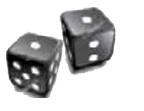Two dice are rolled simultaneously . Find the probability of
Getting the sum as a prime number .
35
512
12
34
The correct Answer is:B
To solve the problem of finding the probability of getting a sum that is a prime number when two dice are rolled, we can follow these steps:
Step 1: Calculate the Total Outcomes
When two dice are rolled, each die has 6 faces. Therefore, the total number of outcomes when rolling two dice is:
Total Outcomes=6×6=36
Step 2: Identify Prime Numbers
Next, we need to identify the prime numbers that can be obtained as sums when rolling two dice. The possible sums range from 2 (1+1) to 12 (6+6). The prime numbers within this range are:
- 2
- 3
- 5
- 7
- 11
Step 3: Find Favorable Outcomes for Each Prime Sum
Now, we will find the combinations of dice rolls that result in each of these prime sums:
- Sum = 2: (1, 1) → 1 outcome
- Sum = 3: (1, 2), (2, 1) → 2 outcomes
- Sum = 5: (1, 4), (2, 3), (3, 2), (4, 1) → 4 outcomes
- Sum = 7: (1, 6), (2, 5), (3, 4), (4, 3), (5, 2), (6, 1) → 6 outcomes
- Sum = 11: (5, 6), (6, 5) → 2 outcomes
Now, we will add up all the favorable outcomes:
Total Favorable Outcomes=1+2+4+6+2=15
Step 4: Calculate the Probability
The probability P of getting a sum that is a prime number is given by the formula:
P(Prime Sum)=Number of Favorable OutcomesTotal Outcomes=1536
Step 5: Simplify the Probability
Now, we can simplify the fraction:
1536=512
Final Answer
Thus, the probability of getting a sum that is a prime number when two dice are rolled is:
512
---
When two dice are rolled, each die has 6 faces. Therefore, the total number of outcomes when rolling two dice is:
Total Outcomes=6×6=36
Next, we need to identify the prime numbers that can be obtained as sums when rolling two dice. The possible sums range from 2 (1+1) to 12 (6+6). The prime numbers within this range are:
- 2
- 3
- 5
- 7
- 11
Now, we will find the combinations of dice rolls that result in each of these prime sums:
- Sum = 3: (1, 2), (2, 1) → 2 outcomes
- Sum = 5: (1, 4), (2, 3), (3, 2), (4, 1) → 4 outcomes
- Sum = 7: (1, 6), (2, 5), (3, 4), (4, 3), (5, 2), (6, 1) → 6 outcomes
- Sum = 11: (5, 6), (6, 5) → 2 outcomes
Total Favorable Outcomes=1+2+4+6+2=15
The probability P of getting a sum that is a prime number is given by the formula:
P(Prime Sum)=Number of Favorable OutcomesTotal Outcomes=1536
Now, we can simplify the fraction:
1536=512
Thus, the probability of getting a sum that is a prime number when two dice are rolled is:
512
Topper's Solved these Questions
- PROBABILITYBook:ARIHANT SSCChapter:PROBABILITYExercise:INTRODUCTORY EXERCISE -(20.2)
Explore 29 Videos
- PROBABILITYBook:ARIHANT SSCChapter:PROBABILITYExercise:INTRODUCTORY EXERCISE -(20.3)
Explore 22 Videos
- PROBABILITYBook:ARIHANT SSCChapter:PROBABILITYExercise:EXAMPLE
Explore 11 Videos
- PRACTICE SET Book:ARIHANT SSCChapter:PRACTICE SET Exercise:PRACTICE SET-5
Explore 50 Videos
- PROBLEM BASED ON AGESBook:ARIHANT SSCChapter:PROBLEM BASED ON AGESExercise:FASK TRACK PRACTICE
Explore 31 Videos
Similar Questions
Knowledge Check
Two dice are rolled simultaneously . Find the probability of
getting a doublet .A1/12B0C5/8D1/6Two dice are rolled simultaneously . Find the probability of
getting a total sum of 9 .A13B19C89D910Two dice are rolled simultaneously . Find the probability of
getting a doublet .A1/12B0C5/8D1/6
Two dice are rolled simultaneously . Find the probability of
getting atleast one'5'.
View SolutionTwo dice are rolled simultaneously . Find the probability of
getting a total sum of 9 .
View SolutionIn two dice game, the player take turns to roll both dice, they can roll as many times as they want in one turn. A player scores the sum of the two dice thrown and gradually reaches a higher score as they continue to roll. If a single number 1 is thrown on either die, the score for that whole turn is lost. Two dice are thrown simultaneously.

What is the probability of getting the sum as a prime number ?
View SolutionTwo dice are rolled simultaneously . Find the probability of
getting a total of 9 or 11 .
View SolutionTwo dice are rolled simultaneously . Find the probability of
getting a total of 9 or 11 .
View Solution
